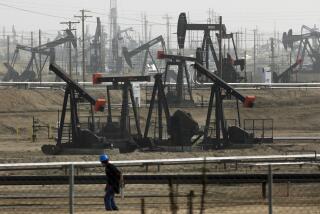Record Exxon profit still disappoints
- Share via
Is it possible for a company to have its best earnings ever for the first three months of the year and the second-best of all time for any corporation and still not please anyone?
The answer is yes if the company is Exxon Mobil Corp., the world’s largest publicly traded oil company. Irving, Texas-based Exxon on Thursday posted first-quarter sales of $116.9 billion, a better performance in three months than all but 52 nations do in a year, according to the International Monetary Fund’s world rankings for gross domestic product.
And Exxon got to keep $10.9 billion, or $2.03 a share, in net profit after all the bills were paid. That was up 17% from year-earlier earnings but less than Wall Street had expected because of weak production and anemic refining profit.
Henry Hubble, the company’s vice president of investor relations and corporate secretary, emphasized the positive during a conference call with analysts and investors: “In an environment of high commodity prices, Exxon Mobil’s outstanding portfolio of integrated businesses performed well, allowing us to deliver record first-quarter results.”
But consumer advocates blasted the company, saying it and other oil companies were posting exorbitant profits at a time when many Americans are hurting from high fuel costs and the weak economy. They also said Exxon spent too much buying back stock and not enough on capital investments in production that could help bring energy costs down.
Members of Congress threatened legislation to rein in oil company behavior. And one of the few families that can trace its investment history with the company all the way back to the old days of Standard Oil -- the Rockefeller clan -- said this week that Exxon Mobil was on the wrong path and not focusing on renewable energy.
Amid record oil prices, analysts polled by Thomson Financial had forecast $2.13 a share in earnings. Investors weren’t thrilled either, sending shares down from $3.37, or 3.6%, to $89.70.
“It was a terrible day for Exxon Mobil,” said Fadel Gheit, senior oil analyst for Oppenheimer & Co. “Their production problems are more pronounced than their rivals’. They are not improving as much either, and with the price of oil so high, they can no longer dictate terms to oil producing countries. They are now at the mercy of geopolitics.”
Gheit said that Exxon was still a powerhouse in many ways, maintaining “the strongest balance sheet in the business, having $40 billion in cash and the most aggressive stock buyback policy in the industry. But he added that not even new deep-water oil developments off the coast of Angola were enough to solve production problems.
Analyst Paul Sankey of Deutsche Bank said the market wanted to see production growth because it was “deeply concerned about future energy supply. . . . Exxon Mobil does not offer that right now.”
Exxon’s results fell shy of its fourth-quarter performance, the company’s best, when it recorded net income of $11.7 billion, or $2.13 a share.
Its 17% profit increase trailed more impressive 25% and 63% gains, respectively, by Royal Dutch Shell and BP. Exxon’s oil and gas production fell 5.6%, leaving the company less leverage on rapidly rising crude prices. Refining profit fell by more than half.
Analyst Phil Weiss of Argus Research said Exxon’s profit got “hurt by higher oil prices, as crazy as that sounds.” That’s due in part from the fact that Exxon Mobil, as the world’s largest refiner of oil, can’t raise those prices fast enough to keep pace, he said.
Exxon’s Hubble said the company was increasing its quarterly cash dividend to 40 cents a share, up 14%, marking its 26th straight year of increased dividends.
In 2007, Exxon spent $31.8 billion buying back stock and $20.9 billion on capital expenditures.
That’s part of the problem, said Tyler Slocum, director of Public Citizen’s Energy Program, who said that if Exxon Mobil won’t spend money where it is most needed, such as on capital investment to reduce the price burdens on consumers and on renewable energy development, then it was time for government to step in and take action.
“It’s not just about beating up on Exxon,” Slocum said. “It’s about making them pay their fair share.”
This year, Exxon has said, it expects to increase its capital spending to about $25 billion. The stock buyback program, Hubble said, “demonstrates our commitment to return cash to our shareholders.”
--
More to Read
Inside the business of entertainment
The Wide Shot brings you news, analysis and insights on everything from streaming wars to production — and what it all means for the future.
You may occasionally receive promotional content from the Los Angeles Times.











